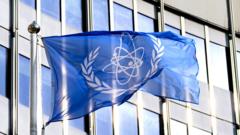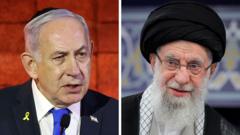Concerns rise as the U.S. Embassy in Jerusalem restricts employee travel amid fears of an impending Israeli attack on Iran, coinciding with broader U.S. military movements in the region.
U.S. Embassy Restricts Movement Amid Israel-Iran Tensions

U.S. Embassy Restricts Movement Amid Israel-Iran Tensions
The embassy's directive follows U.S. troop withdrawals, indicating escalating concerns over potential Iranian retaliation.
In response to escalating tensions in the Middle East, the U.S. Embassy in Jerusalem has taken precautions by restricting movement for its employees and their families. This decision comes as American diplomats and military personnel prepare for the possibility of an Israeli strike against Iran, which could provoke Iranian retaliation. The embassy’s restrictions entail prohibiting travel outside the greater Tel Aviv area, Jerusalem, and Beersheba, although certain exceptions apply.
This directive was issued just a day after the United States pulled diplomats from Iraq and allowed the voluntary departure of military family members from the region, highlighting the gravity of the situation. Reports indicate that both U.S. and European officials believe Israel may be planning an imminent attack on Iran. Such an action could derail ongoing efforts by the U.S. administration to negotiate a nuclear deal with Tehran.
Previously, President Trump had dismissed an Israeli attack plan, favoring diplomatic talks to curb Iran's nuclear ambitions. However, the President's recent comments suggest a shift in confidence regarding these negotiations, expressing doubt about their success, and indicating a sense of urgency.
Israeli Prime Minister Benjamin Netanyahu has consistently stated that Iran must not be allowed to develop nuclear weapons. During an April conference in Jerusalem, he reiterated his commitment, claiming that President Trump shares this urgency. The Israeli military has not commented on the prospect of an attack as tensions continue to rise in the region.
Journalists Michael Crowley and David E. Sanger contributed to this report, highlighting the intensified focus on Iranian threats and diplomatic maneuvers in the ongoing geopolitical crisis.



















